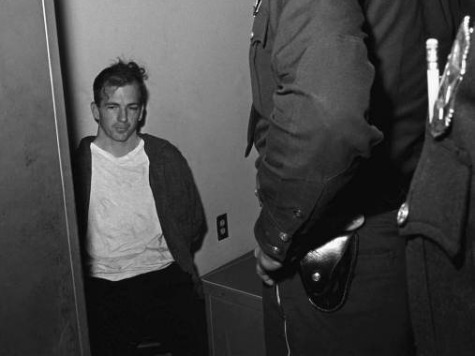On the 50th anniversary of the JFK assassination, a San Francisco Chronicle contributor finds the real culprit: “right-wingers who despised Kennedy” in Texas, whose descendants, “the Tea Party Nation,” “seethe with vitriol” against Obama.
In a Chronicle column Friday titled “JFK Assassination Reshaped Politics of the Right,” Lawrence Rosenthal writes that the assassination of President Kennedy chimed in a “coming of age” for the American right. He does not directly challenge that Lee Harvey Oswald, an avowed communist, was Kennedy’s killer, but he fails to mention this pivotal character to the drama, as well.
Instead, he focuses on the climate in Texas: “edgy, with right-wingers who despised Kennedy.” He argues that the Bay of Pigs confirmed in the rights of the mind that “the Democratic Party is a den of traitors,” and that this climate continues to exist in Texas today. The implication is that the staunchly conservative ideology that defines Texan politics today contributed to the violence in Dallas 50 years ago today (again, no mention of Lee Harvey Oswald; no mention that few were as far from being angry right-wingers as the man who pulled the trigger).
But Rosenthal does not stop at using anecdotes of conservatives attacking Kennedy’s ideology in life as an indication that the violence of the 1960s somehow blossomed from conservative thought. “Today’s right-wing anger is focused primarily on domestic politics,” Rosenthal writes, “Yesterday’s Bay of Pigs is today’s Obamacare.”
He writes with concern that “Texas today seethes with vitriol at President Obama,” and one can’t help get the sense that Rosenthal brims with concern himself that history could repeat itself because conservatives oppose Obamacare (it bears repeating that JFK’s killer was, in his own words, “a communist”). He chides the “domestic-issues McCarthyism” of conservatives today but fails to write a single sentence that links his attacks on the modern American right to his attacks on 1950s Texans. To ask that he explain what the “Tea Party Nation” has to do with anything else in his column would be too much.
He notes that the Tea Party Nation “routinely refers on its blog to the Democrats at the Party of Treason.” One blog, TeaPartyNation.com, indeed occasionally does, but anyone following the development of the Tea Party at any given point in time could tell you the Tea Party movement is fragmented and diverse–speaking with many voices, not one. Rosenthal presumably brings up the “Party of Treason” moniker to corroborate his point that, like today, 1950s Texans considered the Democrats a “den of traitors.” But that is his phrase; he cites no one, and the point is moot.
As the head of the Center for Right-Wing Studies at UC Berkeley–yes, this exists–the Chronicle presumably solicited Rosenthal’s opinion because a historian focusing on the American right could flesh out the impact of the assassination on the development of conservatism. That is to say: that the untimely death of the charismatic head of the opposition party absolutely had repercussions within the Republican Party, and those are fascinating historical wrinkles to be addressed.
To the extent that Ronald Reagan and Barry Goldwater are mentioned in the piece (two sentences), Rosenthal reaches that goal. but in highlighting “vitriol” in 1950s Texas as uniquely conservative and a major player in the JFK assassination (have I mentioned that Lee Harvey Oswald was a communist?), he makes a connection that simply isn’t there–and extends it 50 years into the future, attempting to tarnish the reputation of politically active Americans who have as much of a right to mourn today as anyone on the left.

COMMENTS
Please let us know if you're having issues with commenting.